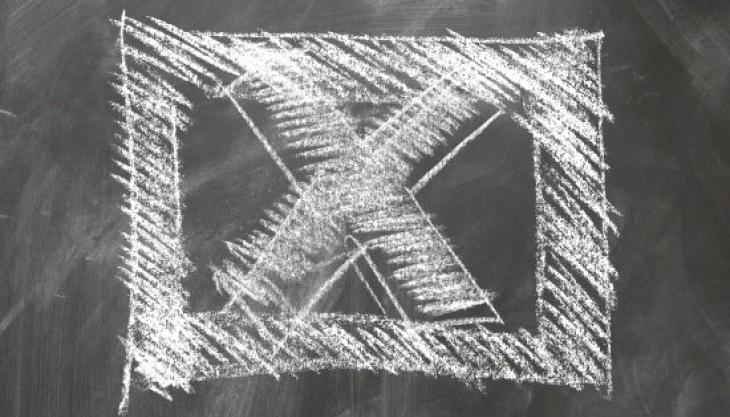Is Charged Off Debt Gone for Good?
Submitted by Rachel R on Mon, 08/06/2018 - 8:36am

Charged off debt is not gone!
Image via Pixabay
Greensboro bankruptcy can help deal with lingering debt you can’t afford that is still active under the statute of limitations. But what about charged off debt? We frequently see questions from consumers who assume that once the debt is “charged off” it’s not their problem anymore. This is not true. It can still come back to bite you so here’s what you must know.
What does charged off mean?
When you don’t pay your credit card (or other bills), after months of trying to get you to pay with no luck, a creditor might charge off the debt. This usually happens within three to 12 months after you make the last payment and persist with non-payment and non-cooperation, depending on the creditor, the type and amount of debt, and their internal policies.
You might get a notice that the debt has been charged off or it might appear on your credit report as a "charge off." You might even learn of the status change if you call to check on the debt for some reason. What’s crucial to know is that “charge off” is an accounting term and reflects how the company records your debt on their books. It has nothing to do with your obligation to pay the amount owed.
Charged off debt is not gone
When a company charges off the debt, they move it off their balance sheet. A company tracks their accounts receivable (money they're owed), but when they figure out you’re not going to pay, they can’t keep it there. They must “write it off” as a bad debt and move it off the balance sheet. But that’s not the end of the debt. They usually sell the debt to a debt collection firm.
Many companies engage in the business of buying bad debt from creditors for a deep discount (sometimes pennies on the dollar) and then aggressively try and collect on it. When the creditor sells the debt, this includes selling the legal right to collect on that debt. Once the sale goes through, you now owe the debt collector, not the original creditor.
Debt collectors are aggressive!
Once the debt collector buys the debt, they launch an aggressive effort to get you to pay what you owe. Some companies cross ethical lines while others will stick with the letter of the law but, even so, they can become a thorn in your side. You can expect letters in your mailbox threatening a lawsuit, calls on your cell, at home, at work, and an all-out campaign to frustrate you into paying.
The one good thing is that debt collection firms will usually accept a lesser amount than the original debt you owed. If the debt is $200, they might have purchased it for $20. If they can get $100 out of you, they are making a 500% profit. However, before they accept a negotiated offer, they will try and harass you to pay the full amount plus collection costs and other fees. It can be stressful.
Statutes of limitation and charged off debt
In Greensboro, North Carolina, the statute of limitations on most types of unsecured consumer debt is three years. That means from the date of your final payment to the creditor a clock starts ticking. When it reaches three years, if there has been no activity, the statute of limitations expires, and the collector cannot sue you in court for a judgment. They can still call, but they have no legal recourse.
Debt collectors know when the statute of limitations will expire on debt they buy and will go to extreme lengths to collect before it runs out (or trick you into restarting the clock). If you pay a creditor even $1 towards old debt, it restarts the statute and gives them another three years. You must be very careful dealing with debt collectors because they are experts at this tactic.
If you have debt that’s not expired yet, whether it’s charged off or not, Greensboro bankruptcy is an effective way to extinguish it. Debt discharged in bankruptcy is gone for good, and the creditor or debt collector legally cannot try and collect it. Plus, as soon as you file bankruptcy, debt collectors must stop contacting you about debt. It’s life-changing peace of mind!
To find out more about dealing with debt collectors, contact the Law Offices of John T. Orcutt. Read reviews from clients, then call +1-833-627-0115 to schedule a free Greensboro bankruptcy consultation at one of our locations in Raleigh, Durham, Fayetteville, Wilson, Greensboro or Wilmington.
Debts Hurt! Got debt? Need help? Get started below!
Serving All of North Carolina
- Bankruptcy Attorneys Raleigh NC (North)
- Bankruptcy Attorney Fayetteville NC
- Bankruptcy Attorney Durham NC
- Bankruptcy Attorneys Wilson NC
- Bankruptcy Attorneys Greensboro NC
- Bankruptcy Attorneys Southport NC
- Bankruptcy Attorneys Wilmington NC
Bankruptcy Attorneys Raleigh NC (North)
6616 Six Forks Rd #203 Raleigh, NC 27615 North Carolina
Tel: (919) 847-9750

Bankruptcy Attorney Fayetteville NC
2711 Breezewood Ave Fayetteville, NC 28303 North Carolina
Tel: (910) 323-2972

Bankruptcy Attorney Durham NC
1738 Hillandale Rd Suite D Durham, NC 27705 North Carolina
Tel: (919) 286-1695


Bankruptcy Attorneys Greensboro NC
2100 W Cornwallis Dr. STE O Greensboro, NC 27408 North Carolina
Tel: (336) 542-5993

Bankruptcy Attorneys Southport NC
116 N Howe St. Suite A Southport, NC 28461 North Carolina
Tel: (910) 218-8682

Bankruptcy Attorneys Wilmington NC
116 N. Howe Street, Suite A Southport, NC 28461 North Carolina
Tel: (910) 447-2987
